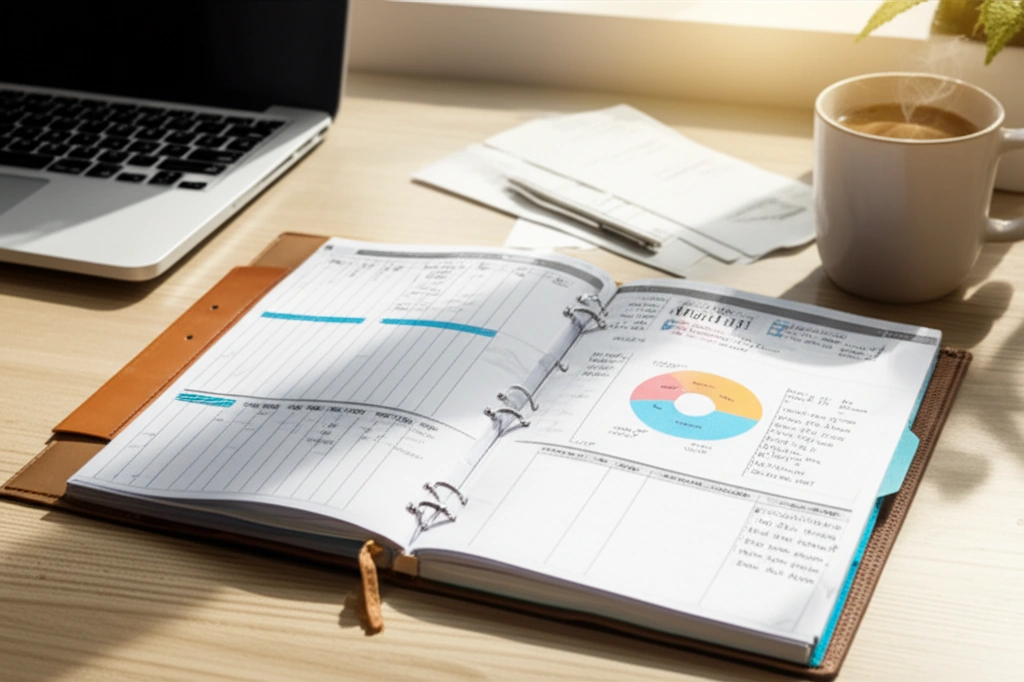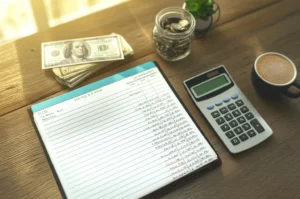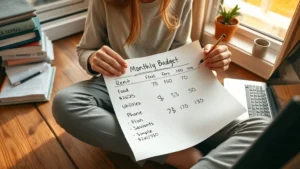Ever feel like your money just vanishes by month’s end? One minute, there’s your paycheck — the next, you’re squinting at your bank app, thinking, “Wait, where did it all go?” If that sounds familiar, let me tell you, you’re not alone. But here’s the secret most folks miss: you don’t need a finance degree to finally feel in control. You just need the right monthly budget planner — and maybe, a slightly new way to look at your own habits. So, let’s dive in, no judgment, no jargon. This is going to be fun — promise!
A monthly budget planner is more than another spreadsheet or app. It’s your money’s GPS — helping you plan the route so you’re not lost, even when money stuff gets, well, messy. I’ll walk you through everything: what to include, how to start, plus real stories and hacks so you can avoid the usual traps. Sound good? Let’s roll.
Why Plan Monthly?
Let’s be real. Most of us aren’t taught in school how to work with our money. Nobody sits us down with a cool, color-coded chart and says, “Here’s how to make sure you always make rent and still have enough for pizza night.” So, why put energy into a monthly budget planner?
How Does Budgeting Actually Help?
Here’s the magic: tracking even one month of finances with a monthly budget planner slaps reality onto the table. Suddenly, you see your true income, your actual expenses, your “Where’d that go?” splurges — everything, in plain sight. It dials down stress, brings goals into focus (weekend getaway, anyone?), and yes, it can help you whittle away debt faster than you think.
Storytime:
I’ve seen a friend go from overdraft fees every. single. month. to having a little cushion, just because she sat down with a planner for 20 minutes. No wild pay raise, just clarity. She even said, “I finally feel like I can breathe.” That’s powerful.
According to the Financial Consumer Agency of Canada, using a free online Budget Planner turns a pile of receipts and guesswork into real steps — like spotting savings and comparing your habits with the average Canadian. Eye-opening, right?
Isn’t Budgeting Risky or Restrictive?
Actually, the real risk is not knowing where your money’s going. The planner helps you avoid those late-night “Uh oh, I forgot about that bill” moments. Of course, if you make your budget too strict, it might feel like a diet you hate and want to rebel against. That’s why flexible, honest tracking is key — don’t set yourself up to fail.
Avoiding Common Traps
Biggest tip? Include a buffer for those “oh-no” moments (like, surprise car repairs). Build in a little fun, too. Your planner isn’t there to nag you — it’s the friend who brings you snacks when you’re stressed.
What Goes In A Monthly Budget Planner?
Alright, you’re in. But where do you even start? Here’s the cheat sheet — and trust me, even if math isn’t your thing, you can do this.
The Must-Haves
- Income: Paychecks, side hustles, anything coming in.
- Fixed expenses: Rent, mortgage, car payment, insurances, subscription fees (hello, streaming…)
- Variable expenses: Groceries, gas, utilities, medical, and yes, the coffee shop runs.
- Savings & debt payments: Emergency fund, retirement, credit card payments.
- Goals: What you’re aiming for (saving up for a trip, or maybe just a stress-free end of month).
Example Budget Table:
| Category | Planned ($) | Actual ($) |
|---|---|---|
| Income | 3000 | 3000 |
| Rent | 1200 | 1200 |
| Utilities | 150 | 140 |
| Groceries | 400 | 425 |
| Savings | 200 | 200 |
| Entertainment | 100 | 110 |
| Other | 300 | 325 |
| Total | 2350 | 2400 |
Optional But Awesome
- Cash envelope breakdown (helpful if you love envelopes, or just like feeling organized)
- Subscription audits (find those sneaky recurring costs you forgot about)
- Sinking funds (saving up for bigger, less regular expenses like holidays or annual insurance)
Side note: there are a ton of free budget templates — from pink and pretty to ultra-minimalist — so you can match your style and mood. Because if you like your planner, you’ll actually use it!
Make Your Monthly Budget Planner: Step By Step
Worried this is going to take hours? Good news — you can overhaul your budget in just a little time, especially if you pick a template that suits your vibe.
1. Gather Your Money Stuff
Grab everything: bank statements, bills, last month’s receipts (scrunched up in your bag? Been there). The more honest you are, the better your planner will work. You don’t need every detail perfect — just what hits your account and what leaves it.
2. Calculate Your Real Monthly Income
What hits your bank after taxes? That’s your real spending power. Got multiple streams (side gigs, freelance, odd jobs)? Average them out if they fluctuate, so you’re prepared.
3. List Your Fixed Expenses
Think rent, mortgage, subscriptions, loan payments. Not every bill pops up monthly (like your car insurance?), so just estimate the monthly share. (If it’s once a year, divided by 12.)
4. Tackle Variable Costs (a.k.a. Money Ninjas)
Groceries, utilities, fuel, eating out. Some stuff changes every month, and that’s okay! Start with your best guess and adjust as you learn.
5. Savings & Debt — Pay Yourself First
Decide on your targets: emergency stash, debt payments, maybe retirement. (No, it’s not too soon. Even $10 a month adds up.)
If you want a real-world breakdown, check this handy personal budget example. It’s super practical, especially for folks who want to see the numbers in action.
6. Review, Adjust, Repeat
Think of your budget like a living thing. It’s okay if it changes monthly. Check in, tweak, and forgive yourself if you blow it on movie snacks. Next month = clean slate.
Tools and Tricks That Actually Make Budgeting Fun
Old-School or Digital?
If you’re hands-on, grab a printable template and have at it. Prefer tech? There are apps that turn budgeting into a game, with badges, charts, and reminders so you never miss a beat. Some planners even let you compare with national averages and save your plan for next month — according to the Financial Consumer Agency of Canada, these tools can make budgeting way less intimidating.
The Spreadsheet Route
Love a good Excel moment? There are templates that do half the math for you, pop in the numbers, and they tally up (some even have colorful charts because, why not?). Microsoft offers a bunch of free, customizable templates if you want to go digital but simple.
On Your Phone
Apps like “Budget planner—Expense tracker” on Google Play are made to keep things visual and simple, offering daily spending logs, tips, and even celebratory badges when you meet your budget goals. If you’re the type to forget your wallet, but not your phone, this might be your style.
Helpful Monthly Budget Planner Examples
Solo Adventure: Personal Budget Example
Your scenario: single, renting, working full-time. You log your take-home pay ($2,800), plug in rent, utilities, groceries, savings, debt, and a pinch for fun. Following the plan, you see where money leaks out — fixing those $100/month snack attacks can mean an easy $1,200 saved a year. For more on breaking it down, check out this detailed personal budget example.
Family Life: Couple With Kids
It gets a bit trickier (and interesting). Expenses are shared, needs vs. wants look different, and priorities change. The monthly budget planner gives you the big picture to keep everyone (even grumpy teens) on the same page. Talk openly; it helps avoid those “You spent how much on coffee?” arguments.
A Quick Note on Business Budgets
If you’re running your own show — side hustle, freelancer, or company — the idea’s the same, but you need to factor in stuff like forecasting, business expenses, and profits. Here’s a solid guide on how to prepare budget for a company if you need more heavy-duty advice, too. The principles are surprisingly similar, just a bit more detail-oriented (and maybe a touch more paperwork).
Tips To Actually Make It Work
Automate What You Can
Life’s busy. Set up automatic transfers to savings, auto-pay regular bills, and you won’t have to think about it. “Set and forget” protects you from missed payments (or overspending the rent money).
Track Those Sneaky Recurring Payments
Ever signed up for a free trial and forgot? I call them budget gremlins. Go through your bank statement every couple of months and cancel what you don’t use. Little leaks add up!
Be Honest, Not Harsh
You might find you spend way more on takeout than planned. That’s okay — now you know! Budgeting isn’t about guilt, it’s about info. Give yourself grace and adjust as you go.
Measure Your Progress (And Celebrate Wins)
Numbers on a page? Nah, this is about progress. Each month, check three things: Do you have money left at the end? Did debt go down? Did savings go up (even just a little)? If yes, that’s a win worth celebrating.
If things slide off track (and trust me, sometimes they will), don’t sweat it. A blown budget isn’t a failure, it’s feedback. Adjust and keep going — you’re learning, not auditioning for accountant of the year.
Building Something Bigger Than a Spreadsheet
We all want more than boring formulas or some kind of permission slip. At the end of the day, your monthly budget planner is about freedom — from worry, from late-night math, from that “I should have known better” regret. It’s your chance to be a little bit more confident, a little bit more you, with every dollar you track.
Conclusion
Let’s wrap this up, friend: The monthly budget planner is your secret weapon. It’s not about restriction — it’s about choices. Start with just your income and bills, add in the extras, and build in some savings (big or small). Check in every month and tweak, don’t quit. Soon, you’ll feel less panic and more excitement as your plan takes shape.
Remember, nobody gets this perfect — not even the experts. But showing up, doing your best, and using the tools out there? That’s huge. If you need visual inspiration, try a personal budget example. If you’re dreaming bigger with a business or side hustle, peek at how to prepare budget for a company for more ideas.
Building a budget is a little like planting a garden. It might look small at first — but keep watering, keep checking, and soon enough, you’ll be surprised by what you can grow. So why not start today? Your future self will thank you, trust me.













